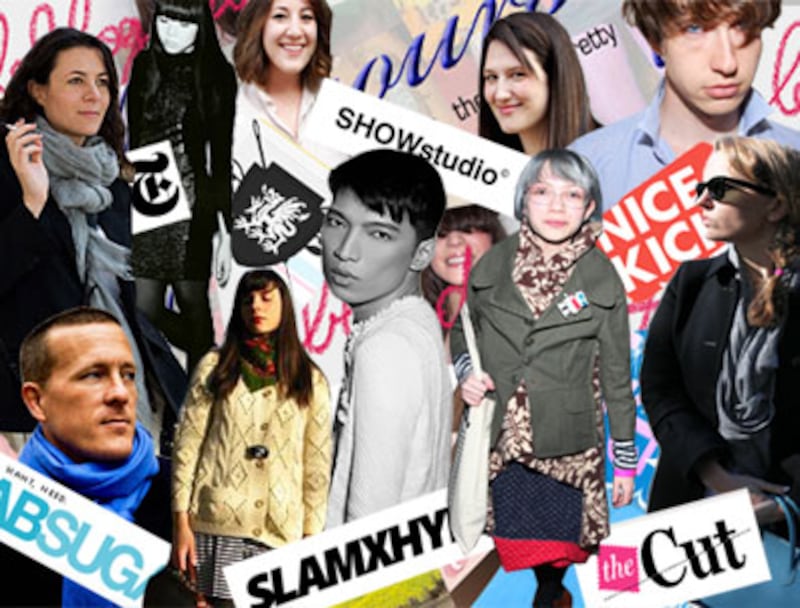On Monday night, Anna Wintour spoke on a panel at the Pratt Institute, where a student asked her about fashion bloggers. "We love as much coverage of fashion as possible," the Vogue editrix told the crowd. "But maybe some bloggers and some of the newcomers to this world have a little bit less experience of, but as I said, the more the merrier. We embrace it."
Click Image to View Our Gallery of the 20 Most Influential Fashion Bloggers

The comments left a bit of a shiver in the room—and the next day, Gawker called her compliments for fashion bloggers "bitchy ."
Wintour's words echoed the sentiments of Joe Zee, the creative director of Elle, who recently spoke on a panel at New York's Fashion Institute of Technology. When asked about how digital media was influencing the fashion industry, Zee, speaking about fashion bloggers, snipped : "…if you don't know what you're talking about, then do you have the credibility to talk about it?"
In a strange, self-fulfilling prophecy, Zee's quote quickly spread around the blogosphere like news of a Rodarte sample sale—yet another mainstream dinosaur was dismissing the digital meteor shower.
But if it used to be easy to wave aside fashion bloggers, and criticize them for being nothing more than kids writing about fashion from their bedrooms, these days they are impossible to ignore. Even Zee, when reached by phone last Monday, explained: "What I was trying to say is that you can't compare Cathy Horyn and Tavi ," he says of The New York Times' fashion critic and the popular blogger Tavi Gevinson, who turned 14 on Wednesday. "One is a fashion critic who has been doing this for a number of years and can reference things that she's seen. The other is doing it to be fun and quirky. Can Tavi reference a collection that happened five years ago? She was 8. But there is room for both in fashion journalism."
In just a few years of existence, fashion bloggers have already become influential tastemakers. They are often granted front-row seats at fashion shows, they've been profiled by The New York Times, photographed for Vogue—and one even had a bag named after him by Marc Jacobs. And this year, for the first time, two of the most famous bloggers, Tavi and Bryan Boy, voted for the prestigious CFDA awards, which will be presented on June 7.
But with the increasing success, of course, comes new problems. Some bloggers are now realizing what many fashion magazines have struggled with for years: How do you remain an independent voice without being co-opted by the very industry you cover? Like mainstream fashion editors, bloggers are now swimming in freebies, and industry veterans wonder whether they can maintain enough distance from the brands they critique. They are also expressing reservations about selling out, as some bloggers are making money off their readers and inking corporate deals.
One such blogger is Grechen Cohen, 37, who founded Grechen's Closet, in 2004. In 2006, she was able to quit her job working on business development for projects between American and Israeli companies because she began making enough money with the blog, which focuses on shopping. Since then, she's blogged about favorite products and where to find the best discounts. She's supported herself through both advertising and affiliate programs, whereby she collects a finder's fee on items that she recommends to readers that they go on to buy on e-commerce sites. Now, she says, she makes over $50,000 a year on her blog.
Like Cohen, other bloggers aren't just relying on advertisers—they're also making money from "affiliate" deals with major shopping sites. In November 2009, Net-a-Porter founder Natalie Massenet noted that bloggers and affiliate sites represented 5 percent of the company's sales.
A year before that, Cohen says that 65 percent of her revenue came from advertisers and 35 percent through commissions on affiliate sales. This year, she says, that ratio has flipped—and she now collects 35 percent of her revenue from advertisers, and 65 percent through affiliate sales—which she thinks represents how her readers have reacted to the recession, and, because they "identify with me," are driven to splurge on quality items because of her recommendations. Pierre Rougier, owner of PR Consulting, says that bloggers have influence over their readers especially when it comes to "impulse" buys—accessories that readers can quickly purchase online. "When a blogger starts loving a bag or a shoe," he says, "You know it has impact."
They may be gaining in popularity, but bloggers' real influence is not so easy to measure. A blog called Signature 9 has created the Style 99—a Forbes 500-like quarterly ranking of the 99 most influential style blogs, the most recent of which was published last week. The list is calculated by scoring bloggers on "general content quality, popularity, and buzz."
While some bloggers have monetized through affiliate programs or traditional advertising, others have used their blogs as launching pads for lucrative deals. Tavi has scored writing gigs at Pop Magazine and Harper's Bazaar, she's designed T-shirts, and has been paid by Target to do a video promoting Rodarte's line for the store. Sea of Shoes blogger Jane Aldridge has designed two shoe collections for Urban Outfitters. Susanna Lau of Style Bubble got a job for Dazed Magazine because of her blog, and The Coveted's Jennine Jacob says she is in the process of launching a denim site funded by a fashion company.
All of these projects advance while bloggers continue doing what they do best: writing about what they like. While the Federal Trade Commission dictates a policy of full-disclosure to bloggers where there are conflicts of interest, they have long been criticized by print journalists for receiving gifts and engaging in other free or incentivized projects. But many bloggers assert that there exists an unfair double standard, and that editors at glossy magazines enjoy similar perks.
The fashion bloggers interviewed for this article unanimously expressed their desire to be judged only for what they set out to do—and to not be held to the same standards as journalists. "I do not see myself as a journalist," Bryan Boy insists. "At the end of the day, it's just a diary."
Susanna Lau of Style Bubble agrees: "The media thinks that bloggers are trying to be authority figures—when it's just a girl in her bedroom, trying to put herself out there with the things she likes."
But even with full disclosure, editors, writers and experienced bloggers expressed concern over whether new style bloggers could separate their newfound access from objectivity. "The problem is that so far the younger bloggers have not been able to resist all of this attention—to be a part of this article and sit in the front row," says The New York Times' fashion critic Cathy Horyn. "And I don't know how effective you can be sometimes with that if you're just coming in as a newcomer and you're wowed by the glamour and the fun of it."
And while bloggers have accelerated the metabolism of the fashion industry, many of the top bloggers know they may soon be over. "It's going to thin out in a couple of years," Grechen Cohen says. "So many things change from your early 20s to your 30s." For many, that means going mainstream—to magazines. One designer suggested that this generation of bloggers is destined to be "the future editors of America" because they're "the only ones who are going to know how a magazine can be a real-time dialogue."
Brian Phillips of Black Frame agrees: “There are flashes in the pan, and they matter for a minute,” he says. “But I find it more interesting who can parlay their platform into a bigger platform. The only ones that can do that are the ones who can write, can capture the zeitgeist—and can describe it in a unique way that other people can internalize.”
Yet Robin Givhan, The Washington Post's fashion critic, is skeptical of whether bloggers can make the leap. "I don't know if they will evolve into the standard bearers in the industry," she says. "I don't know if they'll adopt the standards the mainstream media has—or if they'll just change those standards."
Bryan Boy admits he's not sure he'll have longevity. "I don't think I'm going to be in the front row for the rest of my life," he says. "It could go away at any second. So why should I stop myself from saying what I want, when everything could be taken away from me?"
And though they've won fame, successful bloggers are setting the bar high for newer and younger fashion fans who want to follow in their well-heeled footsteps. It's no longer acceptable to re-post pictures from Style.com and write about it—readers are looking to bloggers for something instantly fresh and different. "There was that initial romance," says Cathy Horyn of the early hype. "And now it's the question of how sustainable it is for the bloggers. We expect to see something more now from them. And I'm sure we will—or we'll see it from a new blog."
Isabel Wilkinson is an assistant editor at The Daily Beast based in Los Angeles.






